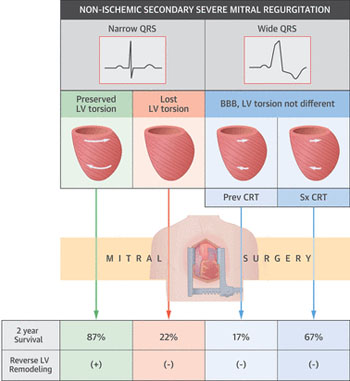Pre-Operative Cardiac Sonography May Predict Outcomes
By MedImaging International staff writers
Posted on 03 Aug 2016
A new study suggests that a simple pre-operative echocardiographic assessment of left ventricular (LV) torsion could predict the outcomes of mitral valve surgery.Posted on 03 Aug 2016
Researchers at Hayama Heart Center (Kanagawa, Japan) examined 50 consecutive patients with nonischemic, chronic, secondary severe mitral regurgitation (NICSMR). All patients had advanced heart failure (HF) symptoms, and had received the maximum guideline-directed medical therapy for more than six months. The patients were divided into three groups: preserved LV torsion, lost LV torsion, or patients with a wide QRS who received cardiac resynchronization therapy (CRT). All patients received either mitral valve repair or mitral valve replacement.

Image: A summary of the study (Photo courtesy of Yuichi Notomi / Hayama).
Two years after surgery, 19 of the patients had died. The researchers found that LV torsional profile predicted post-surgical outcomes in NICSMR patients with a narrow QRS band, but not in those with a wide QRS band. Patients who received CRT prior to mitral surgery showed significantly worse two-year survival than those who received the procedure during mitral surgery. However, the two groups had similar LV torsion. The study was published on June 27, 2016, in JACC: Basic to Translational Science.
“These findings show that lost left ventricular torsion and previously administered cardiac resynchronization therapy appear to be markers of poor survival after mitral surgery in patients with NICSMR,” said lead author Yuichi Notomi, MD, of the division of cardiovascular imaging. “We also found that reverse remodeling was only observed in patients with preserved left ventricular torsion, demonstrating that lost left ventricular torsion and wide QRS were markers of no reverse remodeling viability.”
“Mechanistically, this study suggests that the loss of torsion in patients with heart failure may reflect irreversible structural damage to the heart which would prevent the heart from recovering after corrective surgery,” said Douglas Mann, MD, editor-in-chief of JACC: Basic to Translational Science. “If correct, this will have much broader implications than improvement after mitral valve surgery, since it may predict which patients with heart failure may get better on medications.”
Related Links:
Hayama Heart Center












.jpg)

